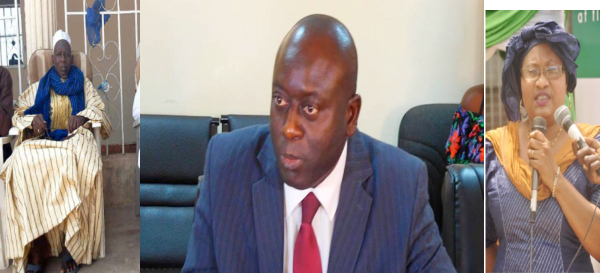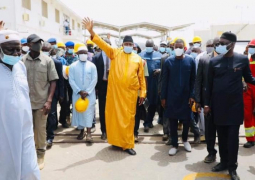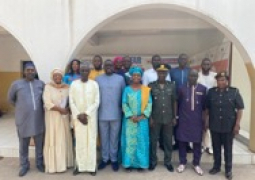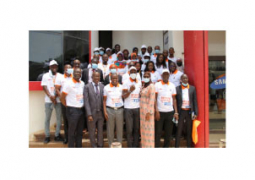
Sare Gubu, a community about 350km from Banjul has complained about this nightmare for over a decade. The residents have to walk to the outskirts of the village or hang their mobile phones up to get network services.
This reporter can confirm that the majority used Orange Sim Card (Senegalese mobile telecommunication Sim Card) to browse because none of The Gambia’s mobile telecommunication functions in that area effectively.
Speaking to The Point exclusively, Alhagie Sura Bah, the head for Sare Gubu Basiru village described the poor mobile telecommunication network in the village as one of the greatest challenges for the residents.
“If you need network services here you have to go outside the home,” he decried.
He said they find it difficult to communicate to their travelled brethren both in the country and abroad due to the poor network.
He said Orange Sim Cards have dominated Gambians’ telecommunications at the village and its surroundings. He said the money they spend on purchasing credit is going to the Senegal instead of The Gambia.
“We are using Orange Sim Cards because we have no other option. Our wish is we would have been using Gambian sim cards so that the money we spend on credit remains in the country,” he said.
Ebrima D. Bah, a teacher at Sare Gubu Basic Cycle School, said the residents cannot use Gambian GSM operators’ sim cards for regular phone calls talk less of browsing.
“I personally used an Orange Sim Card to browse,” he said.
In the 2018-2021 National Development Plan (NDP) document, the President Barrow-led government promised to increase roll out of regional Information and Communication Technology (ICT) Centres to enhance connectivity to schools and communities. It also assured to upgrade telecom access network.
However, Bah said sometimes the community would be totally incommunicado due to poor network, adding: “Even if we have an emergency, we would find it very difficult to communicate. At some point, we will have death cases at health facilities but we cannot communicate well. Sometimes our people abroad would receive the information before us due to poor network.”
Bah, one of the Orange Sim Cards users, said: “I have very fine internet service with my Orange Sim Card.”
He added: “I as a Gambian, it is not fair for me to use a Senegalese sim card while in The Gambia but I have no choice.”
The teacher argued that the residents of that area are Gambians like any other person in the country; therefore, he said they deserve a good network to ensure effective and efficient communication.
Amie Bah, a visitor said: “I have both Qcell and Africell sim cards but since I came here, none of them is functioning effectively. In fact, I have to switch off my mobile phone to save the battery. I only switch it on if I want to use the torchlight.”
Ms. Bah said the poor network had affected her seriously, noting that whenever she travels, she called home to communicate with the family but at this time, it does not happen due to the nature of the community.
Muhammed Bah, a businessman who visited his native village said: “Whenever I visit the village, I would not access my email, Instagram, WhatsApp, and others.”
This, he said, always affects his business because he cannot communicate with his customers and business partners.
“I cannot spend much time here due to the poor network services,” he complained.
Basiru Bah, a law lecturer at The University of The Gambia, who visited his village told this medium that all Gambians irrespective of geographical setup have the right to social amenities and Sare Gubu residents are no exception.
The International Covenant on Civil and Political Rights (ICCPR); International Covenant on Socio-Economic and Cultural Rights (ICSECR), and The Banjul Charter – African Charter on the Rights and The welfare of People (ACRWP) provide that socio-economic rights are basic necessities for every individual and every state in Africa is under an obligation to provide service for her people.
Lawyer Bah argued that it’s Gambia government’s failure to provide such services for the community. He added the locality and the entire rural area are lagging behind in getting social amenities.
The legal practitioner called on government through the Ministry of Information and Communication Infrastructure to fulfill its obligation by providing all the necessary social amenities, especially network services for the residents.
“If we are to drag The Gambia government to court based on their failure to provide these resources, they would be obliged by the African Union to provide for these services. If they fail to do that, we (The Gambia) may even face sanctions at the state level. We may face an economic embargo from the rest of the continent,” he told this reporter.
For her part, Elizabeth Mendy-Johnson, general manager for the state’s telecommunication company Gamcel explained that currently, Telecommunication Company does not have nationwide network coverage but added that the company has a network expansion project which she believes would serve every Gambian.
“The project has been already rolled out. Currently, the feasibility study is done, and we are looking at areas where to place our network infrastructure which I believe is going to cover the whole country,” she said.
Read Other Articles In Headlines





